- Home
- Ian Mcewan
Amsterdam
Amsterdam Read online
Praise for Ian McEwan and Amsterdam
“[Ian McEwan] is one of England’s consistently interesting fiction writers.”
—Daphne Merkin, The New Yorker
“You won’t find a more enjoyable novel…. Masterfully wrought, sure to delight a reader with even half a sense of humor.”
—The Atlanta Journal-Constitution
“One wonders how the ruthlessly witty Mr. McEwan might scavenge the rich trove of material available to an observer of political life on this side of the Atlantic.”
—Washington Times
“McEwan writes the sort of witty repartee and scathing retort we wished we’d thought of in the heat of battle. On a broader scale, McEwan’s portrayal of the mutually parasitic relationship between politicians and journalists is as damning as it is comic.”
—The Christian Science Monitor
“A good thing in a small package: pungent, philosophical, and beautifully written.”
—Time Out New York
“McEwan, a careful observer of contemporary moral bankruptcy and hypocrisy, sketches a number of clever character studies…. His sharp wit will make readers squirm between smirks.”
—Hartford Courant
“Amsterdam, with its tabloid frenzy and poisoned champagne glasses, honors a venerable British tradition that numbers Stevenson, Saki, Hitchcock, among others. Sardonic, polished, and deadpan hilarious.”
—Milwaukee Journal Sentinel
“Both insightful and elegiac … McEwan’s millennial novel, although brief, packs a wallop.”
—New Orleans Times-Picayune
“Both wickedly clever and cleverly wicked.”
—Fort Worth Star-Telegram
“McEwan writes elegantly, with an admirable deadpan wit…. Part thriller, part high comedy, part novel of ideas, and [Amsterdam] manages to be all these things in a very neat, lean package.”
—Palm Beach Post
“A multilayered tableau of love and revenge with all the power of Sophocles, right down to the sudden ferocity of the ending. McEwan is an amazing artist, and Amsterdam is an amazing book.”
—Dayton Ohio News
“Thoughtful, urbane, and plot-driven…. One of the liveliest and most provocative novels of the last year.”
—Arizona Daily Star
“Amsterdam is an ingenious construction, sly and sophisticated. Like all of the author’s clever fictions, it is an easily digested divertissement that wittily conspires to entertain and fascinate and succeeds wholly.”
—Memphis Commercial Appeal
IAN MCEWAN
Amsterdam
Ian McEwan is the bestselling author of more than ten books, including the novels Atonement, The Comfort of Strangers, and Black Dogs, all shortlisted for the Booker Prize, and The Child in Time, winner of the Whitbread Award, as well as the story collections First Love, Last Rites, winner of the Somerset Maugham Award, and In Between the Sheets. He has also written screenplays, plays, television scripts, a children’s book, and the libretto for an oratorio. He lives in London.
BY IAN MCEWAN
First Love, Last Rites
In Between the Sheets
The Cement Garden
The Comfort of Strangers
The Child in Time
The Innocent
Black Dogs
The Daydreamer
Enduring Love
Amsterdam
Atonement
The Imitation Game
(plays for television)
Or Shall We Die?
(libretto for oratorio by Michael Berkeley)
The Ploughman’s Lunch
(film script)
Sour Sweet
(film script)
To Jaco and Elisabeth Groot
The friends who met here and embraced are gone,
Each to his own mistake;
—W. H. AUDEN, “The Crossroads”
I
i
Two former lovers of Molly Lane stood waiting outside the crematorium chapel with their backs to the February chill. It had all been said before, but they said it again.
“She never knew what hit her.”
“When she did it was too late.”
“Rapid onset.”
“Poor Molly.”
“Mmm.”
Poor Molly. It began with a tingling in her arm as she raised it outside the Dorchester Grill to stop a cab—a sensation that never went away. Within weeks she was fumbling for the names of things. Parliament, chemistry, propeller she could forgive herself, but less so bed, cream, mirror. It was after the temporary disappearance of acanthus and bresaiola that she sought medical advice, expecting reassurance. Instead, she was sent for tests and, in a sense, never returned. How quickly feisty Molly became the sickroom prisoner of her morose, possessive husband, George. Molly, restaurant critic, gorgeous wit, and photographer, the daring gardener, who had been loved by the foreign secretary and could still turn a perfect cartwheel at the age of forty-six. The speed of her descent into madness and pain became a matter of common gossip: the loss of control of bodily function and with it all sense of humor, and then the tailing off into vagueness interspersed with episodes of ineffectual violence and muffled shrieking.
It was the sight now of George emerging from the chapel that caused Molly’s lovers to move off farther up the weedy gravel path. They wandered into an arrangement of oval rose beds marked by a sign, THE GARDEN OF REMEMBRANCE. Each plant had been savagely cut back to within a few inches of the frozen ground, a practice Molly used to deplore. The patch of lawn was strewn with flattened cigarette butts, for this was a place where people came to stand about and wait for the funeral party ahead of theirs to clear the building. As they strolled up and down, the two old friends resumed the conversation they had had in various forms a half-dozen times before but that gave them rather more comfort than singing “Pilgrim.”
Clive Linley had known Molly first, back when they were students in ’68 and lived together in a chaotic, shifting household in the Vale of Health.
“A terrible way to go.”
He watched his own vaporized breath float off into the gray air. The temperature in central London was said to be twelve degrees today. Twelve. There was something seriously wrong with the world for which neither God nor His absence could be blamed. Man’s first disobedience, the Fall, a falling figure, an oboe, nine notes, ten notes. Clive had the gift of perfect pitch and heard them descending from the G. There was no need to write them down.
He continued, “I mean, to die that way, with no awareness, like an animal. To be reduced, humiliated, before she could make arrangements, or even say goodbye. It crept up on her, and then …”
He shrugged. They came to the end of the trampled lawn, turned, and walked back.
“She would have killed herself rather than end up like that,” Vernon Halliday said. He had lived with her for a year in Paris in ’74, when he had his first job with Reuters and Molly did something or other for Vogue.
“Brain-dead and in George’s clutches,” Clive said.
George, the sad, rich publisher who doted on her and whom, to everyone’s surprise, she had not left, though she always treated him badly. They looked now to where he stood outside the door, receiving commiseration from a group of mourners. Her death had raised him from general contempt. He appeared to have grown an inch or two, his back had straightened, his voice had deepened, a new dignity had narrowed his pleading, greedy eyes. Refusing to consign her to a home, he had cared for her with his own hands. More to the point, in the early days, when people still wanted to see her, he vetted her visitors. Clive and Vernon were strictly rationed because they were considered to make her excitable and, afterward, depressed about her condition. Another key male, the foreign secreta
ry, was also unwelcome. People began to mutter; there were muted references in a couple of gossip columns. And then it no longer mattered, because the word was she was horribly not herself; people didn’t want to go and see her and were glad that George was there to prevent them. Clive and Vernon, however, continued to enjoy loathing him.
As they turned about again, the phone in Vernon’s pocket rang. He excused himself and stepped aside, leaving his friend to proceed alone. Clive drew his overcoat about him and slowed his pace. There must have been over two hundred in the black-suited crowd outside the crematorium now. Soon it would seem rude not to go over and say something to George. He got her finally, when she couldn’t recognize her own face in the mirror. He could do nothing about her affairs, but in the end she was entirely his. Clive was losing the sensation in his feet, and as he stamped them the rhythm gave him back the ten-note falling figure, retardando, a cor anglais, and rising softly against it, contrapuntally, cellos in mirror image. Her face in it. The end. All he wanted now was the warmth, the silence of his studio, the piano, the unfinished score, and to reach the end. He heard Vernon say in parting, “Fine. Rewrite the standfirst and run it. I’ll be there in a couple of hours.” Then he said to Clive, “Bloody Israelis. We ought to wander over.”
“I suppose so.”
But instead they took another turn about the lawn, for they were there, after all, to bury Molly.
With a visible effort of concentration, Vernon resisted the anxieties of his office. “She was a lovely girl. Remember the snooker table?”
In 1978 a group of friends rented a large house in Scotland for Christmas. Molly and the man she was going about with at the time, a QC named Brady, staged an Adam and Eve tableau on a disused snooker table, he in his Y-fronts, she in bra and panties, a cue rest for a snake and a red ball for an apple. The story handed down, however, the one that had appeared in an obituary and was remembered that way even by some who were present, was that Molly “danced naked on Christmas Eve on a snooker table in a Scottish castle.”
“A lovely girl,” Clive repeated.
She had looked right at him when she pretended to bite the apple, and smiled raunchily through her chomping, with one hand on a jutting hip, like a music hall parody of a tart. He thought it was a signal, the way she held his gaze, and sure enough, they were back together that April. She moved into the studio in South Kensington and stayed through the summer. This was about the time her restaurant column was taking off, when she went on television to denounce the Michelin guide as the “kitsch of cuisine.” It was also the time of his own first break, the Orchestral Variations at the Festival Hall. Second time round. She probably hadn’t changed, but he had. Ten years on, he’d learned enough to let her teach him something. He’d always been of the hammer-and-tongs school. She taught him sexual stealth, the occasional necessity of stillness. Lie still, like this, look at me, really look at me. We’re a time bomb. He was almost thirty, by today’s standards a late developer. When she found a place of her own and packed her bags, he asked her to marry him. She kissed him, and quoted in his ear, He married a woman to stop her getting away/Now she’s there all day. She was right, for when she went he was happier than ever to be alone and wrote the Three Autumn Songs in less than a month.
“Did you ever learn anything from her?” Clive asked suddenly.
In the mid-eighties Vernon too had had a second bite, on holiday on an estate in Umbria. Then he was Rome correspondent for the paper he now edited, and a married man.
“I can never remember sex,” he said after a pause. “I’m sure it was brilliant. But I do remember her teaching me all about porcini, picking them, cooking them.”
Clive assumed this was an evasion and decided against any confidences of his own. He looked toward the chapel entrance. They would have to go across. He surprised himself by saying rather savagely, “You know, I should have married her. When she started to go under, I would have killed her with a pillow or something and saved her from everyone’s pity.”
Vernon was laughing as he steered his friend away from the Garden of Remembrance. “Easily said. I can just see you writing exercise yard anthems for the cons, like what’s-her-name, the suffragette.”
“Ethel Smyth. I’d do a damn better job than she did.”
The friends of Molly who made up the funeral gathering would have preferred not to be at a crematorium, but George had made it clear there was to be no memorial service. He didn’t want to hear these three former lovers publicly comparing notes from the pulpits of St. Martin’s or St. James’s, or exchanging glances while he made his own speech. As Clive and Vernon approached they heard the familiar gabble of a cocktail party. No champagne trays, no restaurant walls to throw back the sound, but otherwise one might have been at one more gallery opening, one more media launch. So many faces Clive had never seen by day light, and looking terrible, like cadavers jerked upright to welcome the newly dead. Invigorated by this jolt of misanthropy, he moved sleekly through the din, ignored his name when it was called, withdrew his elbow when it was plucked, and kept on going toward where George stood talking to two women and a shriveled old fellow with a fedora and cane.
“It’s too cold, we have to go,” Clive heard a voice cry out, but for the moment no one could escape the centripetal power of a social event. He had already lost Vernon, who had been pulled away by the owner of a television channel.
At last Clive was gripping George’s hand in a reasonable display of sincerity. “It was a wonderful service.”
“It was very kind of you to come.”
Her death had ennobled him. The quiet gravity really wasn’t his style at all, which had always been both needy and dour; anxious to be liked, but incapable of taking friendliness for granted. A burden of the hugely rich.
“And do excuse me,” he added, “these are the Finch sisters, Vera and Mini, who knew Molly from her Boston days. Clive Linley.”
They shook hands.
“You’re the composer?” Vera or Mini asked.
“That’s right.”
“It’s a great honor, Mr. Linley. My eleven-year-old grand-daughter studied your sonatina for her final exam in violin and really loved it.”
“That’s very nice to know.”
The thought of children playing his music made him feel faintly depressed.
“And this,” George said, “also from the States, is Hart Pullman.”
“Hart Pullman. At last. Do you remember I set your Rage poems for jazz orchestra?”
Pullman was the Beat poet, the last survivor of the Kerouac generation. He was a withered little lizard of a man who was having trouble twisting his neck to look up at Clive. “These days I don’t remember a thing, not a fucking thing,” he said pleasantly in a high-pitched, chirpy voice. “But if you said you did it, you did it.”
“You remember Molly, though,” Clive said.
“Who?” Pullman kept a straight face for two seconds, then cackled and clutched at Clive’s forearm with slender white fingers. “Oh sure,” he said in his Bugs Bunny voice. “Molly and me go way back to ’65 in the East Village. I remember Molly. Oh boy!”
Clive concealed his disquiet as he did the sums. She would have turned sixteen in the June of that year. Why had she never mentioned it? He probed neutrally.
“She came out for the summer, I suppose.”
“Uh-uh. She came to my Twelfth Night party. What a girl, eh, George?”
Statutory rape, then. Three years before him. She never told him about Hart Pullman. And didn’t she come to the premier of Rage? Didn’t she come to the restaurant afterward? He couldn’t remember. Not a fucking thing.
George had turned his back to talk to the American sisters. Deciding there was nothing to lose, Clive cupped his hand about his mouth and leaned down to speak in Pullman’s ear.
“You never fucked her, you lying reptile. She wouldn’t have stooped to it.”
It wasn’t his intention to walk away at this point, for he wanted to hear Pullm
an’s reply, but just then two loud groups cut in from left and right, one to pay respects to George, the other to honor the poet, and in a swirl of repositioning Clive found himself freed and walking away. Hart Pullman and the teenage Molly. Sickened, he pushed his way back through the crowd and arrived in a small clearing and stood there, mercifully ignored, looking around at the friends and acquaintances absorbed in conversation. He felt himself to be the only one who really missed Molly. Perhaps if he’d married her he would have been worse than George, and wouldn’t even have tolerated this gathering. Nor her helplessness. Tipping from the little squarish brown plastic bottle thirty sleeping pills into his palm. The pestle and mortar, a tumbler of scotch. Three tablespoons of yellow-white sludge. She looked at him when she took it, as if she knew. With his left hand he cupped her chin to catch the spill. He held her while she slept, and then all through the night.
Nobody else was missing her. He looked around at his fellow mourners now, many of them his own age, Molly’s age, to within a year or two. How prosperous, how influential, how they had flourished under a government they had despised for almost seventeen years. Talking ’bout my generation. Such energy, such luck. Nurtured in the postwar settlement with the state’s own milk and juice, and then sustained by their parents’ tentative, innocent prosperity, to come of age in full employment, new universities, bright paperback books, the Augustan age of rock and roll, affordable ideals. When the ladder crumbled behind them, when the state withdrew her tit and became a scold, they were already safe, they consolidated and settled down to forming this or that—taste, opinion, fortunes.
He heard a woman call out merrily, “I can’t feel my hands or feet and I’m going!” As he turned, he saw a young man behind him who had been about to touch his shoulder. He was in his mid-twenties and bald, or shorn, and wore a gray suit with no overcoat.

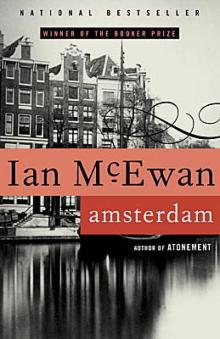 Amsterdam
Amsterdam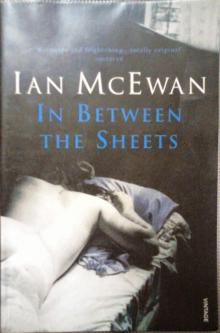 In Between the Sheets
In Between the Sheets Atonement
Atonement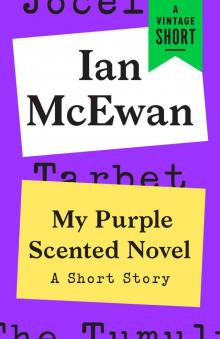 My Purple Scented Novel
My Purple Scented Novel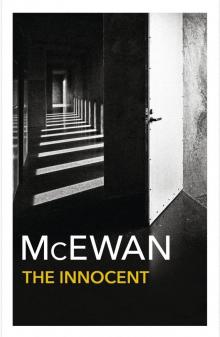 The Innocent
The Innocent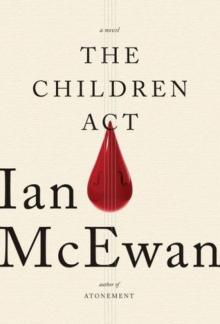 The Children Act
The Children Act Enduring Love
Enduring Love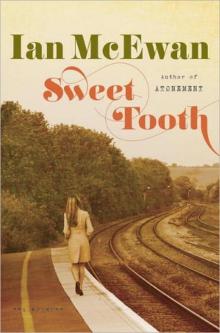 Sweet Tooth
Sweet Tooth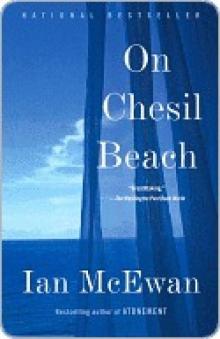 On Chesil Beach
On Chesil Beach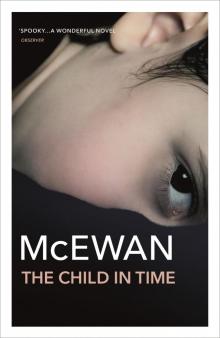 The Child in Time
The Child in Time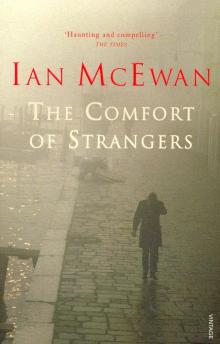 The Comfort of Strangers
The Comfort of Strangers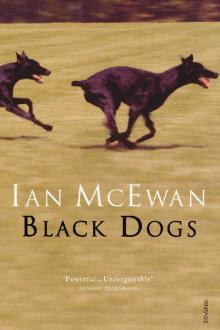 Black Dogs
Black Dogs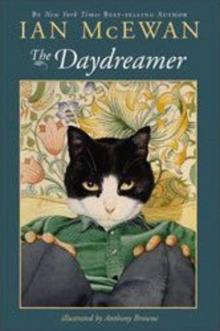 The Daydreamer
The Daydreamer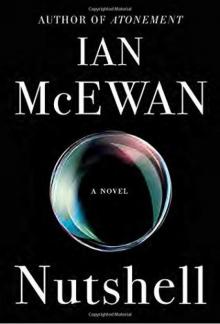 Nutshell
Nutshell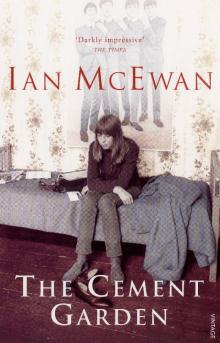 The Cement Garden
The Cement Garden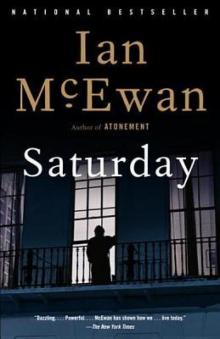 Saturday
Saturday Machines Like Me
Machines Like Me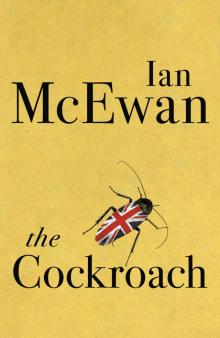 The Cockroach
The Cockroach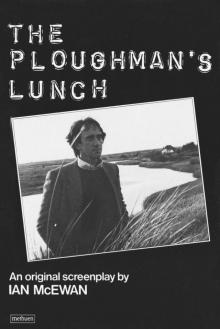 The Ploughman’s Lunch
The Ploughman’s Lunch